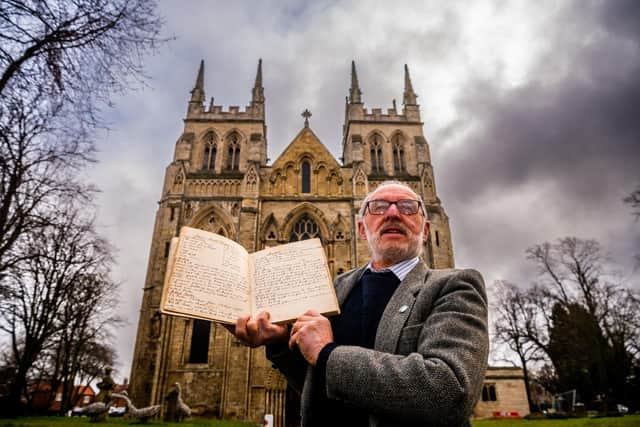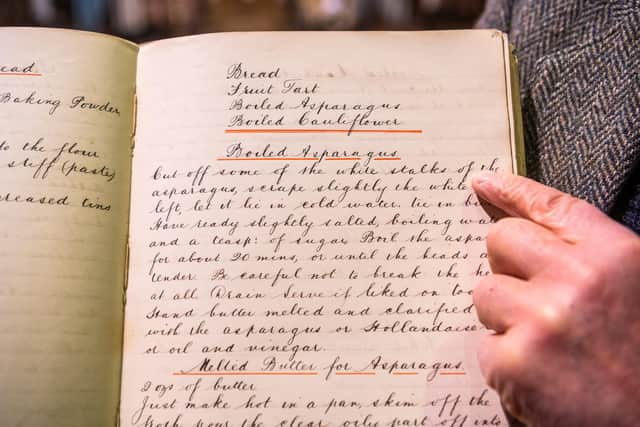The 'tatty' charity shop find notebook revealing recipes from early 1900s Yorkshire
The others, sadly, had only one destination. Tired and tatty, they were set for the shredder, each kilo pulped earning roughly ten pence for the charity. A battered and old, green notebook was fated for that discard pile. Without hesitation, David tossed it across the table towards a book bin. Fortuitously, he missed. The book fell to the floor.
“My aim wasn’t very good and the book opened to expose all this fabulous copperplate writing,” David recalls. “Much too good to be pulped so I put it to one side.”
Advertisement
Hide AdAdvertisement
Hide AdHis tea-break that day came eagerly-awaited, a chance for a first thumb through the pages of his accidental find. ‘Mary Eleanor Blakey’, the author introduced herself on its title page. It was dated April 21, 1903. What David, now 67, found was a document of culinary and social history, one he is set to talk about at a celebration of food and drink at Selby Abbey later this month.


Mary had composed a book of both household recipes and kitchen management rules, offering, a century later, a glorious insight into a bygone era. “Here was someone who had written down all kinds of arcane knowledge that is now totally lost - how to clean your knives and forks, how you had to make your own washing up liquid,” David says.
“It struck me that I was holding in my hand a first hand account of an entire world that had disappeared…And I’m fascinated by how we used to live and the ways of life that were once commonplace and are now forgotten.”
His find in Selby back in 2012, came just after a stint of work with what is now The National Lottery Heritage Fund. The former chemistry teacher had spent three years as a hidden heritage officer for Selby, uncovering lesser known histories about the town and its people.
Advertisement
Hide AdAdvertisement
Hide AdNow he’d found a new project. David set about investigating the life of Mary Blakey, delving into research archives and even tracking down her distant living relatives. “I built up this story and the more I built up, the more fabulous and intriguing it became,” he says.


After four years of work, he published Durability, efficiency, economy, a book which offers an insight into Mary’s life whilst also presenting her guide to cookery and kitchen management for factory girls, domestic servants and labourers’ daughters.
“Mary described the attributes of a good kitchen stove as ‘durability, efficiency, economy’,” David writes. “I’ve taken that phrase of hers to be the title of the book, encapsulating as it does her approach to thriftily-produced yet nourishing food from a ‘modern’ kitchen.”
Mary, late of Bowthorpe Hall, near Selby, was a farmer’s daughter, born near Ripon in 1876. It is thought that she started her book to use when teaching evening classes in domestic science which she gave for a time in Rothwell, near Leeds. But she gradually added more recipes throughout the rest of her life.
Advertisement
Hide AdAdvertisement
Hide Ad“Part of it is to inform her evening classes and I think part of it is because she was the oldest daughter in a family of nine,” David muses. “Although she starts writing this down in 1903, in 1904 her father dies and she’s making her way in the rhubarb triangle but is summoned back to the family home and I think she’s writing a book so she and her sisters can help run the family home at Bowthorpe Hall.”
As for her evening classes, Mary wrote outline plans for 20, each one featuring a main meal and a pudding, as well as scullery work. “She’s very good at telling you how you have to wash up your cake pans and how you have to have make sure your skillets are clean. She was ahead of her time – ahead of the national curriculum coming in when you had to write down your lesson plans…Her book makes it very clear that her lessons must be attractive to her class because she knows very well if it’s boring or going above the heads of these labourers’ daughters and factory girls, they’re not going to turn up.”
Mary, who was awarded an MBE for her hospital work during the First World War, when she took a leading role in caring for wounded soldiers, noted down more than 150 dishes in what was to become that tatty, green notebook that David found. Among them, dishes like Irish stew and teacakes remain familiar today, whilst others - battered tripe and stuffed sheep’s heart, to name two – are perhaps less likely to be served up as modern meals.
“She’s clearly writing for an audience of people who want to give their husbands something cheap and cheerful but tasty and nutritious," David says. “The book is full of lots of ways that she has taken ‘posh’ recipes and simplified them down, making something almost as good but with ingredients much cheaper.”
Advertisement
Hide AdAdvertisement
Hide AdIn his talk at Selby Abbey, he’s set to explore some of her regional recipes and how even with the least expensive ingredients people can make food that is tasty to eat. His wife, meanwhile, is planning to get busy in the kitchen, preparing such delicacies as potato cheesecake and moggy – a Yorkshire gingerbread, for people to try.
"I’m really glad Mary’s marvellously-presented kitchen manual fell open on the way to the recycling bin,” David reflects. “If it hadn’t, then there would not have been the chance to bring her wisdom to a wider audience.”
Eat Your Heart Out, a celebration of local food and drink, takes place on March 31 from 10am until 4pm at Selby Abbey. It includes food stalls as well as events, talks and live cooking demonstrations.
